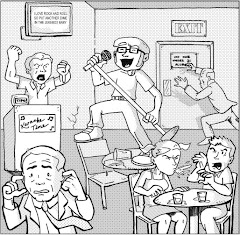The Generic Comic #1, April 1984, Marvel Comics
creators unknown
The Generic Comic is essentially a template for how to create a comic book the Marvel way. Its cover summarizes its efforts perfectly: "One neurotic Super-Hero type with a variety of personal problems; one bad-guy bent on world domination through arcane means; assorted villainous hench-people; the hero's nefarious employer, pathetic family, and well-endowed girlfriend; a plot containing a conflict, a sub-plot, a resolution, a plot twist, and as many fights as it takes to full up the rest of the pages." While this stripped description initially strikes the reader as a satirical jest, these characteristics are truly the qualifiers that establish a successful superhero story. Still, the one element that the writers of this disclaimer couldn't identify, the element that no one can clearly define, is whether this story connects a general audience.
Reading this description, Stan Lee's groundwork on Spider-man is the first reference that comes to mind, though many other commonplace heroes from several different comic book publishers. Yet, Spidey was the first superhero with "real world" problems, and his awkward adolescence, coupled with his cool costume and quirky powers, guaranteed a dichotomy of familiarity and wonder for his young readership. Does the hero of The Generic Comic make the same connection?
In my opinion, unfortunately, no. Though The Generic Comic boasts all of the building blocks of a superhero action-adventure, it's means to that end are a bit too ridiculous to accept. For example, at the beginning of this story, after our nameless hero bids farewell to his girlfriend, traveling to visit an ailing relative, he regrets that he cannot afford to give her a better life then visits his younger brother, experiencing his third month in a coma. One circumstance would have been sympathetic enough, but the two combined expand beyond sympathetic to obscenely pathetic. Afterward, the hero inexplicably develops super-strength due to an over exposure to, of all things, his collection of glow-in-the-dark paraphernalia. He spends his day trying to cover up his new bulging muscles and powers, and after a vow to use his skills for good, he encounters a villain with the hypnotic ability to decrease one's confidence. Our hero fits his old football helmet with a walkman to drown out the bad guy's suggestions, and though he saves the day, he loses his chance at a promotion when his boss is exposed as the guy that hired the villain in the first place. At one point in the story, our hero quips, "This is a coincidence which practically defies belief!" I couldn't have said it better myself.
See, I think the difference between this generic story and Spider-man's early days is that Stan Lee couldn't have anticipated the connection he'd make with readers of all ages. He gave awkward adolescents a hero to whom they could relate, and he gave readers a hip, subversive social commentary. In this series' attempt to recreate that magic, they fail horribly, in that the most successful connections made with readers are often the most unintentional or surprising ones. To package a comic under the presumptions of these paradigms is a bit pompous on the creators' part. Further, the art work in this issue is barely acceptable, and while some panels are solid, others appear to have been drawn by a third grader. A generic comic should at least offer generic art, which would be good enough not to be bad, but average enough not to blow readers away. If the story goes to these lengths . . .
This generic comic book idea is a concept that has been attempted again in recent years, and though the premise is interesting, its implementation is guaranteed to fail. The specifics necessary to establish a unique identity to this series and thus an intrigue for a general audience are ironically and intentionally denied by the point of the title in the first place. Further, though I acquired this issue for fifty cents, I can't help but notice its sixty cent price tag, which is what the other comics of its time cost. Should a generic comic book cost a little bit less? In my opinion, that's certainly what it's worth.
Wednesday, June 20, 2007
Subscribe to:
Post Comments (Atom)



No comments:
Post a Comment